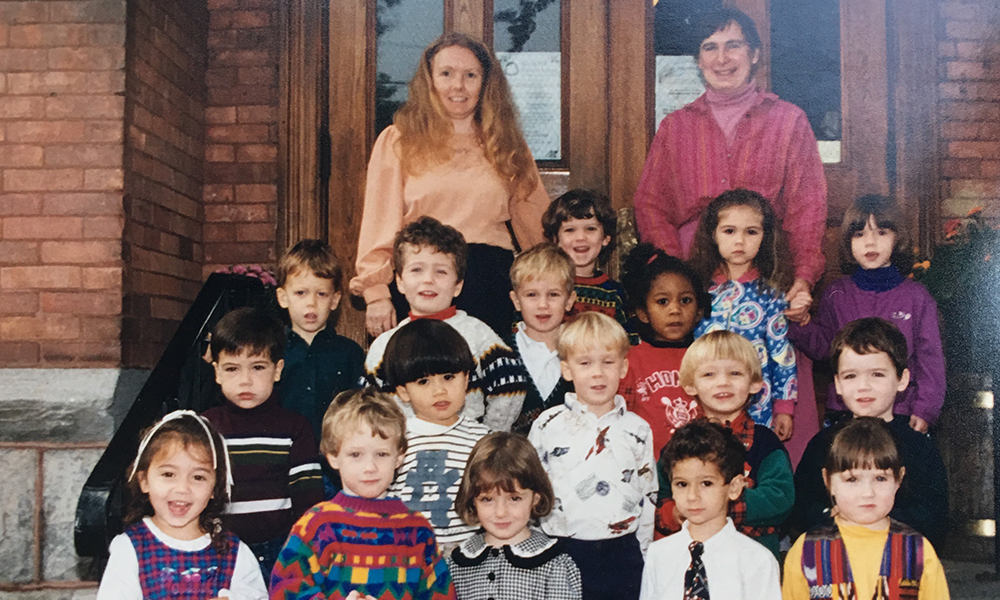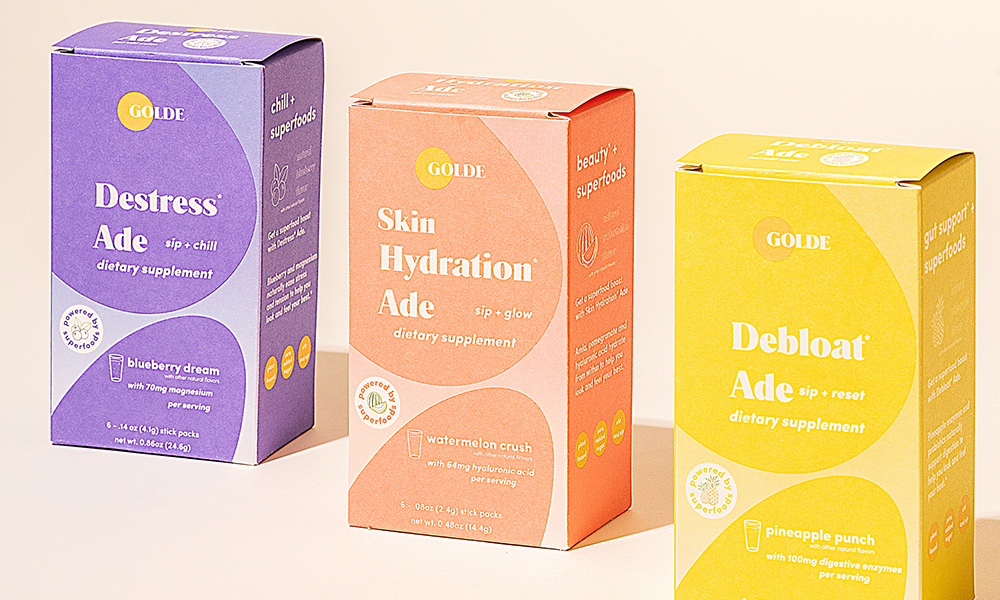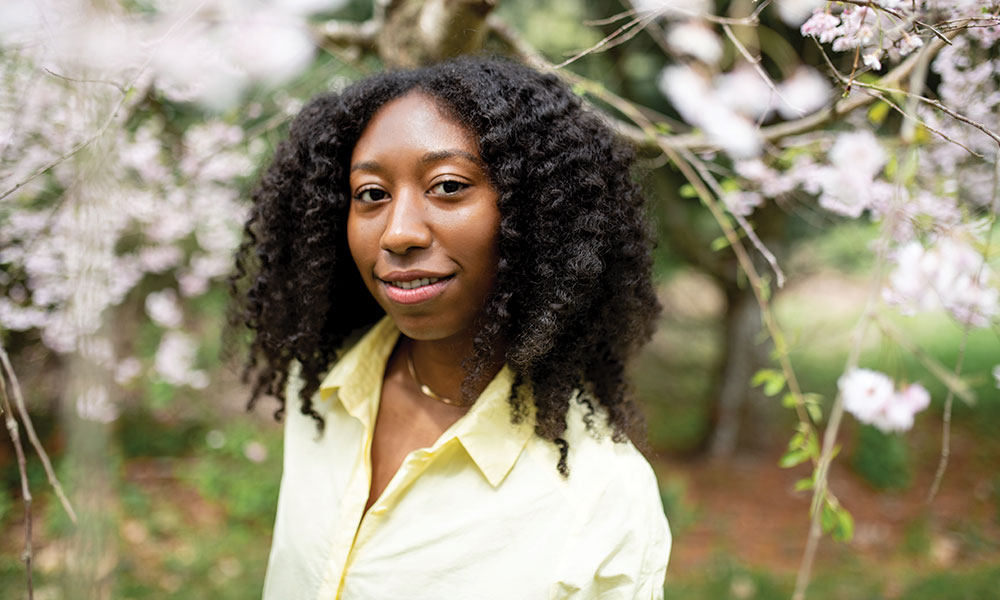The story of Golde begins with love. If you can believe it, 28-year-old Trinity Mouzon Wofford and her same-aged fiancé, Issey Kobori, met for the first time in a Saratoga Springs preschool. Of course, this was almost a quarter century before the would-be engaged couple would cofound wellness and beauty brand Golde, which in a little over three years, has transformed them into Millennial superstar entrepreneurs, landing them on Forbes’ coveted “30 Under 30” list and eventually getting their products on the shelves of Target.
While the couple technically launched their business in Brooklyn, where both lived for years before recently returning home, their success story is indelibly connected to Saratoga—and puts a big red checkmark next to two of the city’s unofficial buzzwords: “history” and “health.” Both Wofford and Kobori grew up here; Kobori, who was born in Japan, landed here when he was two and his family settled on the west side, while Wofford, born in Florida and here since she was two as well, lived mainly on the east side. Even as toddlers, the two had a lot in common: For starters, they both grew up in artsy households that emphasized healthy living and eating. Kobori’s dad worked at Four Seasons’ longtime Phila Street location (#RIP), while the Woffords, both musicians—her mom, a singer-songwriter, her dad, a bassist and former member of jazz fusion group Spyro Gyra—frequented the health food shop, becoming regulars there. Later on, Wofford’s mom and aunt even opened their own natural goods store, Eco Verde, on Broadway. While Kobori spent his childhood on Division Street—his parents later relocated to a sprawling property nestled in the countryside of the Stillwater area—Wofford says some of her fondest memories are from living in one of Saratoga’s most historic, iconic houses. “A significant amount of my childhood was spent at 1 York Street, which is now the Mouzon House,” says Wofford. “My great-grandmother purchased it in 1919, and she lived there until her death. My grandparents then lived there, and my mom and I lived there for a time, so that was a really special place for me.” Speaking of her late grandmother, Mia Mouzon—hence Trinity’s middle name—she was an I-am-woman-hear-me-roar pioneer herself; in 1947, she became the first woman of color to graduate from Skidmore College, and was a true inspiration to Wofford, especially when it came to cofounding her business. “She imparted a lot of wisdom to me about health and wellness,” she says. “She was was ahead of her time, being all-organic and focusing on nonprocessed foods. One of my earliest vocabulary words was ‘partially hydrogenated fats,’ so I’ve been [reading] labels on packages for most of my life.”
The future couple wound up at separate high schools—Wofford at Saratoga, Kobori at Schuylerville—and didn’t formally meet again until their senior year. That happened at New Visions, a one-year, quasi-pre-pre-med program for high schoolers who hope to someday break into the medical field (they both wanted to be doctors). Upon graduation, Wofford went off to New York University (NYU), while Kobori attended Union College. But he quickly became restless being so close to home and transferred to NYU. “Trinity actually didn’t want me to come there,” he says, half-jokingly. “She was having a great time, but it was either that or Columbia, and I liked downtown more.” Though they were initially worried they might turn into that couple—you know, the one that follows each other around everywhere like puppy dogs—in the end, it was the right decision. New York City was the perfect fit.

And the City is where they stayed, post-graduation, living together in a one-bedroom apartment in Brooklyn’s trendy Williamsburg neighborhood and picking up their first day jobs, Wofford in internet marketing, Kobori at an artisanal tableware company and then at a menswear startup he launched. But nothing sustains a budding entrepreneur’s motivation quite like personally experiencing a need you think you can meet. Wofford’s mom was suffering from an autoimmune disorder called rheumatoid arthritis, which causes excruciating joint pain. After regularly seeing a holistic physician, she saw great improvement, but the staggering costs were simply unaffordable. And a light bulb went off for Wofford and Kobori: They would create a wellness brand that anyone could have access to and afford. Golde was launched in 2017, their first product a latte blend made with turmeric, a type of superfood her mom had been using to curb her inflammation and that is also known to have skin rejuvenation and pro–gut health qualities. “I was really thinking about this place of accessibility within the wellness space,” says Wofford of her tonic, which retails for only $26 for a 30-day supply. “That’s really critical. I was looking at the wellness space and feeling that it was speaking to a narrow perspective, especially given that so many of these incredible superfoods were coming from cultures outside of the west, and there’s really not a whole lot of awareness. As a business that was started by two people of color, we wanted to make sure we were building a brand through that lens.”
Kobori, who serves as Golde’s creative director, says that in the early years of the brand, he and Wofford were designing and packaging everything themselves. They were also “pounding the pavement,” getting their products placed in like-minded, independent retail shops and cafes in the City, while also selling them directly to consumers on their website. “We weren’t really aiming to become a massive company overnight,” he says. “We were just focused on getting our stuff out there, growing in a sustainable way and moving forward. I don’t think we ever felt any pressure to succeed.” Their early business plan took a page out of Kobori’s parents’ own company’s playbook—his mom and dad own the Schuylerville-based Kobo Candles—which focused more heavily on getting their products on store’s shelves versus solely having an e-commerce presence. Of course, as children of the digital/social age, Wofford and Kobori had the latter wrapped up early on, as well as a blackbelt in social media, but they wanted customers to actually see their products in the wild. “From an early point,” Wofford says, “folks had this sense that they were finding us everywhere.”
The couple has since expanded the Golde line to include everything from wellness-specific products (a matcha powder additive for lattes and smoothies; and superfood blends like the whimsically titled Shroom Shield, which features cacao and two types of mushrooms and acts as a dietary supplement) to beauty-minded ones (Golde sells a Papaya Bright Face Mask and Green Detox Kit). Wofford and Kobori work with a range of manufacturers across the country and source their superfoods from vendors all over the world. Their matcha, for instance, comes from the Uji region in Japan, known, historically, as being a hub for the plant’s production.

The beauty business, on the other hand, evolved out of the wellness one in a completely organic way, explains Wofford. “I was dealing with breakouts on my skin and was truly desperate to find [a solution],” she says. “So I ended up [exploring] Golde’s product development cabinet of superfood powders and started putting stuff on my skin, and it was one of those early combinations that made a difference.” It was a fortuitous moment, too, because by late 2018, beauty behemoth Sephora came calling, inking a deal with the couple and making Wofford the youngest Black woman to launch a beauty line there in its history. Golde has also forged partnerships with major retailers such as Nordstrom, Urban Outfitters and as of January, its biggest-get yet, Target. “The most magical moment of the whole process was going to our local Target and seeing Golde on the shelves for the first time,” says Wofford. “It’s displayed with a nice little shelf-topper with a picture of my face on it. I think the girl stocking the shelves heard me audibly yelp and just walked away.” (Golde’s products are currently in 460 Targets across the country, including the Clifton Park location; keep your eye out for Saratoga placement in the future.)
There’s no denying that the pandemic has helped put wellness front of mind for many folks, which was helpful to Golde. This year alone, they’ve launched five new products, including their latest, Coconut Collagen Boost, a powder-based product that promotes hair, skin and nail health. So far, the couple have chosen not to work with outside investors, and instead expand at a pace that’s organic to them.
It’s not lost on the couple that their story is a relatively uncommon one today, especially given the color of their skin. “There are always challenges doing this as a woman, young person, person of color and a Black person,” says Wofford of her place in the world of entrepreneurship. “But there are also just challenges to doing it. I think that I’ve always known to just push through those things, whatever that challenge was and whyever it happened to be impacting me.” She takes that a step further. “In the new climate that we’re seeing with this movement to support Black-owned brands, there are more retailers reaching out [to us], more customers on our website and more press pieces. With that, I think it’s this balance of leaning into the opportunities but also being thoughtful about which ones feel meaningful and intentional, and which ones aren’t looking to fill a quota.”

Now that Golde has gone national, Wofford feels she has a responsibility to mentor prospective BIPOC/female entrepreneurs, who might be looking for their breakthrough moment, too. “I felt that growing up and being one of the few people of color graduating from my high school,” says Wofford. “There was always this pressure to be representative, and now there is this added layer of how I can pass that forward. I’ve tried to do that as much as I can for entrepreneurs in general, really.” Case in point: Wofford has a free business mentorship video series on her Instagram, searchable by the hashtag #office_hrs, and also hosts private Mentor Mondays on Zoom with would-be business owners. She’s clearly proud of having made it through the startup phase and doesn’t mind showing off her scars: She didn’t take a salary for the first three-and-a-half years Golde was in business. “I think that transparency is something that’s missing from the entrepreneurship space,” she says. “The sexiness around female entrepreneurs in the past 10 years was very glamorous and was really about seeing these women posed up on these magazines with their arms folded, looking like bosses. That’s great, but I’ve found that I wanted to go one step deeper, because when I was starting my business and that was all I had to see as a blueprint, there was no talk of what really happened to get from point A to B. And that was what I really wanted to talk about.”
Like countless other US brand leaders, Wofford and Kobori have also been faced with the particularly difficult task of addressing, head on, timely and sensitive subjects such as the murder of George Floyd last May and the rise in hate crimes against Asian people. The pandemic itself, too, was a tough nut to crack. “We have approached these conversations the same way we have approached everything in our business: with transparency, authenticity and humility,” says Wofford. That has come in the form of personal notes to customers, as well as the founders helping to raise thousands of dollars for the NAACP Legal Defense Fund. “I think that is really what the modern consumer is looking for from the brand that they support,” says Wofford. “They expect brands to act as if there were real people behind them, because there are.”
For most businesses, getting a product or product line in a retailer like Nordstrom or Target would be a pot-of-gold-at-the-end-of-the-rainbow goal. So what happens when you’ve already realized that dream? “We’ve done a tremendous amount of work to redefine what wellness looks like for the next generation,” says Wofford. “Before we started, there were no wellness brands talking about inclusivity or accessibility. And now we see that as a pillar across the industry, and I think we can continue to push the category forward. I think we can have our products in every American household.” In other words, look out, world.
6 Questions for Golde’s Co-founders
Trinity Mouzon Wofford and Issey Kobori talk summer in Saratoga Springs.
(1) Are you planning on hosting a post-pandemic wedding in Saratoga?
Issey: It’s all up in the air now; we saw so much incredible growth in our company in 2020 that the wedding planning just got pushed to the side. But we’re both getting pretty tired of the word “fiancée/fiancé.”
(2) How are you planning on spending your Saratoga Summer?
Trinity: We have a big gardening project going on at my mom’s house on Caroline Street. We’ve been out in the backyard clearing things out, building walls, and we’re about to plant a vegetable garden.
(3) What’s your Spa City guilty pleasure?
Trinity + Issey: Soft serve from Humpty Dumpty, Roma’s Italian subs and lemon bars from Putnam Market.
(4) When you’re working on Golde, which artists tops off your playlist?
Trinity + Issey: Jazz artists Pat Matheny and Lee Morgan, and Zamrock (an eclectic Zambian genre that merges psych rock, garage rock, R&B and a number of other types of music)
(5) If you could change one thing about Saratoga, what would it be?
Trinity: There should be a walking path from Downtown Saratoga to Yaddo, and it should run all the way out to Saratoga Lake.
(6) What’s the first thing you’ll do when COVID is finally over?
Trinity: I’ll get on a plane and go somewhere international again. Our last trip was to Southern Italy in October 2019, when we got engaged.


